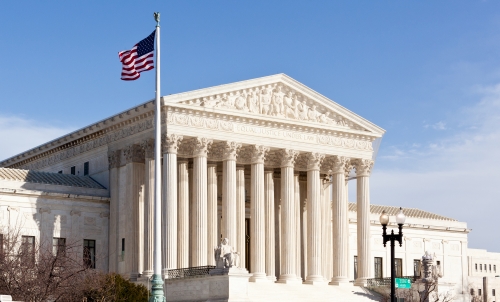The Supreme Court Explains School Choice (Again)
“Separation of Church and State!”
Is there any more misunderstood phrase than “separation of Church and State”? Perhaps that is why for 5 years now, the highest court in the land has been on a Fact Check Tour on what the Constitution actually says about the church-state relationship.
- No, the Constitution does not mean that a Missouri church would not qualify for a state program to make kids’ playgrounds safer just because it happens to be a church (Trinity Lutheran, 2017).
- No, if the state awards grants to children to attend private schools, church schools cannot be shut out from participating just because they are religiously affiliated (Espinoza, 2020).
And yesterday, the coup de grace….
No, schools that actually teach the tenets of their faith as a part of their curriculum may not be excluded from a private school grant program funded by the state (Carson, 2022). The schools are free to help kids and still be true to who they are. In the words of the decision:
A neutral benefit program in which public funds flow to religious organizations through the independent choices of private benefit recipients does not offend the Establishment Clause. See Zelman v. Simmons-Harris, 536 U. S.639, 652–653. Maine’s decision to continue excluding religious schools from its tuition assistance program after Zelman thus promotes stricter separation of church and state than the Federal Constitution requires. But a State’s antiestablishment interest does not justify enactments that exclude some members of the community from an otherwise generally available public benefit because of their religious exercise.
It is interesting that the Court chose the phrase “independent choices of private benefit recipients,” isn’t it? For that concept is the underpinning of the Education Scholarship Account (ESA) mechanism. The state awards grants to children and the parents choose the education provider (often a school).
There is no direct relationship between the state and the school.
In its third decision on the relationship between the Establishment Clause and the Free Exercise Clause as they relate to programs benefitting children, the Supreme Court of the United States pushes back hard on the idea that schools must be something other than who they are to be able to participate in a state-funded program.
The decision yesterday touched on the nature of the flow: State Aid to Child; Parent Choice of School. There is no State to School relationship.
The principle is that the state should take a hands-off approach to the independent school. That is why it makes no sense that a state assessment (test) that is tied to state curriculum standards that is tied to a state curriculum should be required of any school that does not use those standards or that curriculum, especially since those schools already test rigorously using national norm-referenced tests.
THANK YOU!
A heartfelt Thank You to all of the members of the South Carolina Senate and House who sponsored the 2021-22 ESA bill or worked for its passage. It is dangerous to single out individuals, but here are some of the strongest champions (alphabetically):
- Senators Larry Grooms, Greg Hembree, and Rex Rice.
- Speaker Jay Lucas and Speaker Murrell Smith.
- Representatives Shannon Erickson and Jason Elliott.
All Senate Sponsors (S.935): Senators Grooms, Loftis, Goldfinch, Verdin, Rice, Cash, Adams, Climer, Peeler, Garrett, Kimbrell, Davis, Campsen, Hembree, Turner, Corbin, Bennett, Massey, Gambrell, Rankin, Senn and Gustafson.
All House Sponsors (H.3976 or H.4879): Erickson, Elliott, Fry, Lucas, Pope, Simrill, West, B. Newton, G.M. Smith, Bailey, Ballentine, Bannister, Bennett, Bradley, Brittain, Bryant, Burns, Bustos, Caskey, B. Cox, W. Cox, Crawford, Daning, Davis, Forrest, Haddon, Hardee, Herbkersman, Hewitt, Hiott, Hixon, Huggins, Hyde, J.E. Johnson, Jones, Jordan, Kimmons, Ligon, Long, Lowe, Martin, May, McGarry, McGinnis, Morgan, D.C. Moss, V.S. Moss, Murphy, W. Newton, Oremus, Sandifer, G.R. Smith, M.M. Smith, Stringer, Taylor, Thayer, Trantham, Willis, Wooten, Yow, Nutt, McCravy, Magnuson, Blackwell, White, Calhoon.





